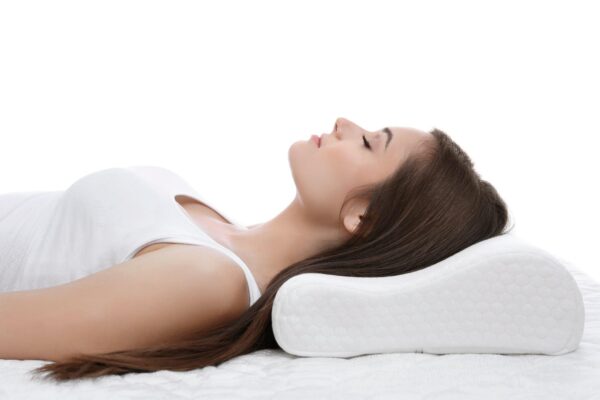How to Sleep After Breast Augmentation Surgery
December 21, 2022
Full recovery after breast augmentation surgery can take up to six to eight weeks.¹ Your doctor will give you specific guidelines for your healing journey after surgery. Sleeping well is important for healing and helping to maintain good health and energy levels.
Sleeping after breast augmentation surgery can be a little challenging at first. You may experience discomfort or even pain if you aren’t careful about how you sleep. We will offer some tips and advice on how to get your best sleep after breast augmentation surgery.
Why Sleep Is Very Important After Breast Augmentation

Before we get into how to sleep after breast augmentation surgery, we want to cover why sleep is so important. Good sleep is an important aspect of healing after any surgery, and your body will let you know that by feeling more tired than usual. It is important to support your body’s healing process with good sleep.
Sleep helps post-surgical recovery in a number of ways:
- Sleep can help lower pain levels. Your doctor will likely prescribe some medications for pain, but making sure that you are maximizing your opportunities for sleep may help you need less pain medication.²
- Sleep is essential for healing. During sleep the immune system kicks into high gear working to fight off infection, the body makes more red blood cells, and it can reduce the overall time needed for a full recovery.³
- Sleep improves mood and cognition. Surgery is not only taxing on the body, but it can be stressful for the mind as well. Depression can occur after any surgery, and sleep is an important factor in keeping depression at bay. Getting enough rest will help restore the emotional reserves needed to get through the recovery process, as well as give you the energy needed to take the best care of yourself at this important time.⁴
How You Should Sleep After Breast Augmentation Surgery

After surgery and during healing, you can expect some swelling and bruising that may make lying down difficult or uncomfortable at first. It is also important that patients avoid heavy lifting or strenuous activity so as not to disturb the implants until they are completely healed.
You should try to sleep on your back after surgery. Your doctor will let you know exactly how long you should spend sleeping on your back before starting to sleep in other positions. Sleeping on your stomach will come last and may be uncomfortable for some time. If sleeping in any position causes pain or discomfort, it’s best to stick with what works for you.
If your doctor recommends a particular supportive bra, it is best to use that until the healing process is complete.
Some things to consider when thinking about how to sleep after breast augmentation surgery are:
- Keeping the upper body elevated is important! This helps to reduce swelling while increasing circulation to the lower body.
- Reduce strain when rising from sleep. Sleeping in a position that is easier to rise from will help reduce the use of the upper body and chest muscles that have been stressed during the surgery. Having that upper body elevation reduces the need to push yourself up from a lying position.
- Make sure no one jostles you during sleep. During the early stages of recovery, you may want to consider a separate bed if you normally sleep with a partner. This will eliminate the possibility of being accidentally bumped into while trying to rest.
- Consider getting a recliner. If you don’t already have a recliner, you may want to purchase or rent one for the time needed to fully recover. A recliner can help keep you in the proper position, help with rising, and offer an easy spot to nap during your healing process.
- Remember to avoid stimulants such as caffeine during your recovery so that you can maximize your sleep at night and even get in some naps.
- You may want to purchase some extra pillows, a wedge-shaped pillow for elevating the upper body, and even a bolster to place under your knees if you tend to have lower back pain when lying on your back. These items will come in handy as you transition to other sleeping positions during the healing process.
Side and Stomach Sleepers Should Prepare Early for Breast Augmentation Surgery and Recovery

If you’re a side or tummy sleeper, you don’t want to wait until the night before surgery to start making adjustments. Changing sleep habits can take some time. Getting used to sleeping in a new position before the post-surgical discomfort sets in will help you heal more quickly.
Some tips for getting used to sleeping on your back are:
- Set a pillow on either side of you in bed. These will help keep you in position, and you may find it more comfortable to rest your arms on pillows rather than having them flat on the bed.
- If you wake up and find you are on your side or tummy, turn on to your back right away, and then let yourself go back to sleep.
- Get a pillow made for back sleepers or try using a wedge-shaped pillow to elevate your upper body. This may result in reducing the tendency to turn onto your side or stomach.
- Place a bolster pillow under your knees. This helps reduce back strain and may make you more comfortable overall.
Practicing sleeping on your back in advance of surgery for at least a week to help your body adjust in time.
Tips for Sleeping Comfortably After Recovery

- Keep your sleeping room cool and dark. Research shows that keeping a bedroom at about 65 degrees Fahrenheit improves sleep.⁵ Of course, this varies from person to person, but be aware that an overly warm room may reduce the quality of sleep. If you are not able to adequately darken your room for sleep, consider using an eye mask to help.
- Take your pain medication as prescribed. If you are likely to need medication at night, try keeping some at your bedside along with some water. Reducing the number of times you need to get out of bed can help improve sleep.
- Exercise during the day. Make sure to move around during the day. Gentle walking and stretching can help tire you out and let your body know that it is time for sleep when night comes around. Getting outdoors if possible will help lift your mood, and sunlight can help send the proper signals to the brain about when it is time for sleep.
- Consider using guided meditations. Listening to a gently guided meditation at bedtime can help you relax and feel more comfortable. Some meditations are even custom-made to help with healing after surgery.
Aesthetic Surgery Institute Is Your Best Choice for Breast Augmentation Surgery
Breast augmentation surgery is typically done on an outpatient basis, so you will be back at home the same day to recover in the comfort of familiar surroundings. If you are considering breast augmentation or any other cosmetic procedure, contact us for a consultation.
Sources:
- https://www.healthline.com/health/breast-augmentation-recovery
- https://www.webmd.com/pain-management/news/20121130/more-sleep-less-pain#1
- https://www.ncbi.nlm.nih.gov/pmc/articles/PMC5768217/
- https://www.healthline.com/health/depression-after-surgery#causes
- https://www.sleepfoundation.org/bedroom-environment/best-temperature-for-sleep
